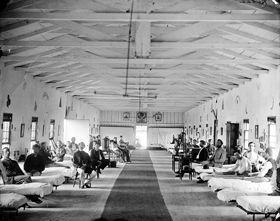Today U.S. President Abraham Lincoln makes an appearance at the U.S. Sanitary Commission‘s fair in Washington, D.C. Lincoln commends the organization’s work on behalf of federal soldiers. Formed in 1861, the Sanitary Commission is a federal government agency tasked with coordinating thousands of volunteers who are collectively ensuring sanitary conditions in military camps and providing logistical help and medical supplies to assist in caring for wounded soldiers. Most of the volunteers are women, many of whom are Baptists.
Sickness and death is an ever present threat in the life of those serving in uniform. Today’s New York Times features the story of a Union officer from New York who recently drowned tragically in Brownsville, Texas. The story traces the time line of the officer’s death, the recover of his body, and his funeral, all which took place in the month of February. The deceased had been a “devoted Baptist.”
BROWNSVILLE, Texas, Tuesday, Feb. 9, 1864.
* * * Our beloved Quartermaster, Lieut. A.H. VASSAR, of whom you have often heard through me, has been drowned, and that before our very eyes. On the 6th inst. the Colonel and Quartermaster rode up to my tent and said they were going over to Bagdad to see the place and pass the day, and wished to know where to cross the inlet. At length they concluded to swim their horses across the mouth of the inlet, as it was narrowest at that point. As the tide was coming in, they accomplished this in safety, though they were up to their arm-pits.
They went to Bagdad, spent the day, and on their return reached the inlet about 6 o’clock in the evening, coming to the shore directly opposite to my camp. The tide was now rushing out of the inlet furiously, still they attempted to cross where they had gone over in the morning. They had gone but a few feet from the shore, however, when the force of the current struck them, their horses became entangled, and poor VASSAR went under, though he came up again a moment after. The Colonel, finding he could not get his horse back to the shore, slid off, and with difficulty managed to reach the point from which they had started. VASSAR used all his strength to turn his horse’s head toward the beach. This, however, could not be done in so furious a current, and so at last when nearly exhausted, he threw himself from his horse and struggled to reach the shore. For a little distance, he seemed to swim well, but sank before he reached the beach. As soon as we realized the danger, we called for the boat, but it was half a mile up the inlet, and poor VASSAR was lost to sight some minutes before it reached the spot, and no trace of him could be seen. During all this time, we were on the Texan side, breathlessly watching, but utterly unable to render the slightest assistance. I never passed so trying, agonizing a moment as when he was just disappearing.
All that night I kept men on the opposite shore watching for his body. The Colonel returned to camp with the sad news, and immediately five or six officers came over and staid here all night. Early next morning, with half of my company, we started up the beach toward Mexico, then crossed and walked some three miles down the Mexican shore, hoping, as the wind had been blowing in that direction, the body might be found. But in vain; with sad hearts we gave up the search, and after dining in Bagdad, returned to camp. I have had men on the beach every day since, but no traces can be found, save his “private diary,” which one of my men picked up on the shore, and which probably washed from his person.
There was no man in the regiment more valuable than he, nor one whose loss would have been so deeply felt. An universal favorite, he had not an enemy. I counted him my best friend, and would have risked my life to save him. He leaves a wife and three children in New-York. He was a devoted member of the Baptist Church, and I have no doubt has gone to rest. He entered the service a year ago as First Sergeant, Co. B, One Hundred and Seventy-sixth New-York Volunteers, and before another year would have been, I have no doubt, a Colonel.***
Feb. 10. — The body of our lamented Quartermaster has been found, on the Mexican shore, seven miles below Clarksvile. * * * *
Feb. 13. — Yesterday morning I was sent for to come to camp to attend the funeral of Lieut. VASSAR.
Sources: “March 18, 1864: Sanitary Commission Fair in Washington,” History.com (link); “The Drowning of Lieut. Vassar,” New York Times, March 18, 1864 (link)



